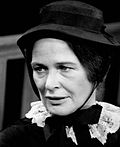| Tony Award for Best Featured Actress in a Play | |
|---|---|
 2025 recipient: Kara Young | |
| Description | Best Performance by an Actress in a Featured Role in a Play |
| Location | United States New York City |
| Presented by | American Theatre Wing, The Broadway League |
| Currently held by | Kara Young for Purpose (2025) |
| Website | TonyAwards.com |
The Tony Award for Best Featured Actress in a Play is an honor presented at the Tony Awards, a ceremony established in 1947 as the Antoinette Perry Awards for Excellence in Theatre, to actresses for quality supporting roles in a Broadway play. The awards are named after Antoinette Perry, an American actress who died in 1946. Honors in several categories are presented at the ceremony annually by the Tony Award Productions, a joint venture of The Broadway League and the American Theatre Wing, to "honor the best performances and stage productions of the previous year." [1]
Contents
- Winners and nominees
- 1940s
- 1950s
- 1960s
- 1970s
- 1980s
- 1990s
- 2000s
- 2010s
- 2020s
- Statistics
- Most wins
- Most nominations
- Character win total
- Character nomination total
- Productions with multiple featured nominations
- Multiple awards and nominations
- Trivia
- See also
- References
- External links
The award was originally called the Tony Award for Actress, Supporting or Featured (Dramatic). Patricia Neal won the first such award for her portrayal of Regina Hubbard in Lillian Hellman's Another Part of the Forest . Before 1956, nominees' names were not made public: [2] the change was made by the awards committee to "have a greater impact on theatregoers". [3] The award was renamed in 1976, when Shirley Knight became the first winner under the new title for her role as Carla in Robert Patrick's Kennedy's Children . Its most recent recipient is Kara Young for the role of Aziza Houston, in Purpose .
Seven actresses (Christine Baranski, Judith Ivey, Judith Light, Swoosie Kurtz, Audra McDonald, Frances Sternhagen, and Kara Young) hold the record for most awards in this category, each with two total. Portrayals of Ruth Younger in A Raisin in the Sun and Mavis Parodus Bryson in The Sign in Sidney Brustein's Window have won twice.








































